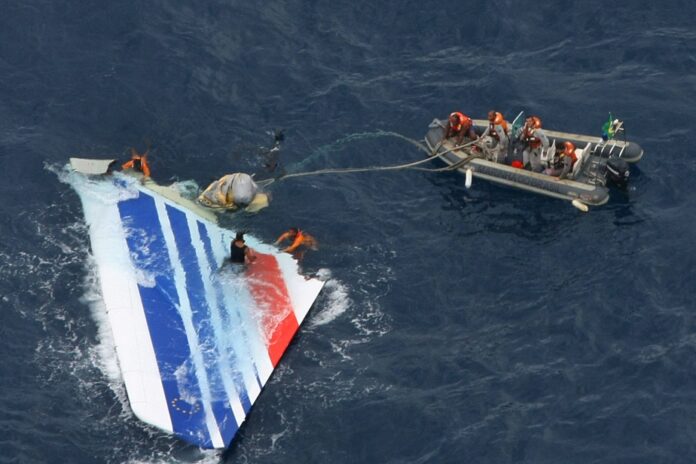(Paris) “Responsible but not guilty”: 14 years after the crash of the Rio-Paris which killed 228 people, the Paris court acquitted Airbus and Air France on Monday, while acknowledging their civil liability, arousing “disgust of relatives of the victims.
The Paris Criminal Court exonerated the two companies on a criminal level, ruling that, if “imprudence” and “negligence” had been committed, “no certain causal link” had “could not be demonstrated” with the deadliest accident in the history of French airlines.
The court delivered its decision in a courtroom packed with relatives of the victims, Air France and Airbus crews and journalists. When the release was announced, some civil parties stood up, stunned, as if to leave the room, before sitting down again when the president began to address the civil aspect.
In this regard, the court ruled that the “mistakes” of the companies had led to a “loss of chance”, i.e. to increase the probability that the accident would occur, declaring Airbus and Air France “civilly liable” for the damages.
The court remanded the issue of the assessment of damages to a hearing on September 4.
“We were expecting an impartial judgment, it was not the case. We are disgusted,” reacted Danièle Lamy, president of the association Entraide et Solidarité AF447. “All that remains of these 14 years of waiting is despair, dismay and anger.”
“We are told: Air France and Airbus are ‘responsible but not guilty’. And it’s true that we were waiting for the word ‘guilty'”, admitted Me Alain Jakubowicz, one of their lawyers. The council nevertheless wanted to retain the civil “responsibility” highlighted by the court: “no, this accident is not due to fate”, “yes, this accident should have been avoided”.
“It doesn’t make sense to me,” reacted, with a trembling voice, Ophélie Toulliou, who lost her brother in the accident, sharing her “feeling of injustice” and her “incomprehension”.
Air France “takes note of the judgment”, according to a press release. “The company will always remember the victims of this terrible accident and expresses its deepest sympathy to all of their loved ones […]”
Airbus considered that this decision was “consistent” with the dismissal pronounced at the end of the instruction in 2019. The group also “expresses” its “compassion” to the relatives of the victims, and “reaffirms [its] total commitment […] in terms of aviation safety”.
On June 1, 2009, flight AF447 from Rio de Janeiro to Paris crashed in the middle of the night in the Atlantic, a few hours after takeoff, resulting in the death of its 216 passengers and 12 crew members.
On board the A330 registered F-GZCP were people of 33 nationalities, including 72 French and 58 Brazilians.
At the end of a marathon procedure marked by contradictory assessments by magistrates, this decision was eagerly awaited. At the end of the trial, which took place from October 10 to December 8, the prosecution had requested the release of the two companies, considering that their guilt was “impossible to demonstrate”.
The first debris of AF447 and bodies had been found in the days following the crash. But the wreckage was only located two years later, after a long search, at 3900 meters deep.
The black boxes confirmed the starting point of the accident: icing of the Pitot airspeed probes as the aircraft flew at high altitude in the harsh weather “Doldrums” area near the equator.
Destabilized by the consequences of this breakdown, one of the co-pilots adopted an upward trajectory and, in the incomprehension, the three pilots failed to regain control of the plane, which stalled and hit the ocean. 4 minutes and 23 seconds later.
The plane’s manufacturer, Airbus, did commit “four reckless or negligent acts”, according to the court, including not replacing a model of Pitot probes, which seemed to freeze more often, on all A330s, given the multiplication of incidents in the months preceding the accident.
Air France has also committed “wrongful recklessness”, continued President Sylvie Daunis, linked to the procedures for distributing a prevention note on the freezing of probes, addressed to its pilots. However, “it must be demonstrated that without” these faults, “the victims’ deaths would not have occurred”, which is not “certain”, the court found.


















